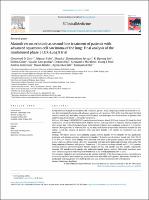| dc.contributor | Vall d'Hebron Barcelona Hospital Campus |
| dc.contributor.author | Goss, Glenwood D. |
| dc.contributor.author | Syrigos, Konstantinos |
| dc.contributor.author | Lee, Ki Hyeong |
| dc.contributor.author | Goker, Erdem |
| dc.contributor.author | Felip Font, Enriqueta |
| dc.contributor.author | Cobo, Manuel |
| dc.contributor.author | Lu, Shun |
| dc.date.accessioned | 2022-03-22T13:47:43Z |
| dc.date.available | 2022-03-22T13:47:43Z |
| dc.date.issued | 2021-07 |
| dc.identifier.citation | Goss GD, Cobo M, Lu S, Syrigos K, Lee KH, Göker E, et al. Afatinib versus erlotinib as second-line treatment of patients with advanced squamous cell carcinoma of the lung: Final analysis of the randomised phase 3 LUX-Lung 8 trial. EClinicalMedicine. 2021 Jul;37:100940. |
| dc.identifier.issn | 2589-5370 |
| dc.identifier.uri | https://hdl.handle.net/11351/7231 |
| dc.description | Afatinib; Segona línia; Carcinoma de pulmó de cèl·lules escamoses |
| dc.description.sponsorship | Boehringer Ingelheim. |
| dc.language.iso | eng |
| dc.publisher | Elsevier |
| dc.relation.ispartofseries | EClinicalMedicine;37 |
| dc.rights | Attribution-NonCommercial-NoDerivatives 4.0 International |
| dc.rights.uri | http://creativecommons.org/licenses/by-nc-nd/4.0/ |
| dc.source | Scientia |
| dc.subject | Pulmons - Càncer - Tractament |
| dc.subject | Pulmons - Càncer - Prognosi |
| dc.subject.mesh | Lung Neoplasms |
| dc.subject.mesh | /drug therapy |
| dc.subject.mesh | Carcinoma, Squamous Cell |
| dc.subject.mesh | Disease Progression |
| dc.title | Afatinib versus erlotinib as second-line treatment of patients with advanced squamous cell carcinoma of the lung: Final analysis of the randomised phase 3 LUX-Lung 8 trial |
| dc.type | info:eu-repo/semantics/article |
| dc.identifier.doi | 10.1016/j.eclinm.2021.100940 |
| dc.subject.decs | neoplasias pulmonares |
| dc.subject.decs | /farmacoterapia |
| dc.subject.decs | carcinoma de células escamosas |
| dc.subject.decs | progresión de la enfermedad |
| dc.relation.publishversion | https://doi.org/10.1016/j.eclinm.2021.100940 |
| dc.type.version | info:eu-repo/semantics/publishedVersion |
| dc.audience | Professionals |
| dc.contributor.organismes | Institut Català de la Salut |
| dc.contributor.authoraffiliation | [Goss GD] The Ottawa Hospital Research Institute, University of Ottawa, Ottawa, ON K1H 8L6, Canada. [Cobo M] Unidad de Gestión Clínica Intercentros de Oncología Médica, Hospitales Universitarios Regional y Virgen de la Victoria, IBIMA, Málaga, Spain. [Lu S] Shanghai Chest Hospital Affiliated to Shanghai Jiao Tong University School of Medicine, Shanghai, China. [Syrigos K] National & Kapodistrian University of Athens, Athens, Greece. [Lee KH] Chungbuk National University College of Medicine, Cheongju, South Korea. [Göker E] Ege University Faculty of Medicine, Izmir, Turkey. [Felip E] Vall d'Hebron Hospital Universitari, Barcelona, Spain. Vall d’Hebron Institute of Oncology (VHIO), Barcelona, Spain. UVic-UCC, IOB-Quiron, Barcelona, Spain |
| dc.identifier.pmid | 34195574 |
| dc.identifier.wos | 000692793000011 |
| dc.rights.accessrights | info:eu-repo/semantics/openAccess |




